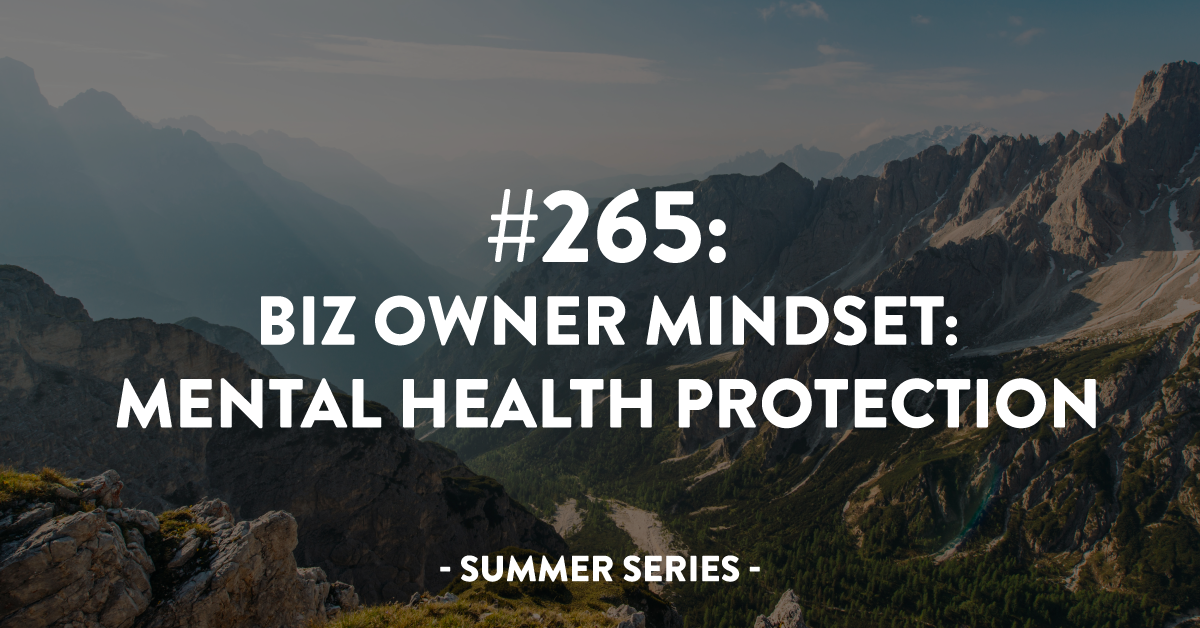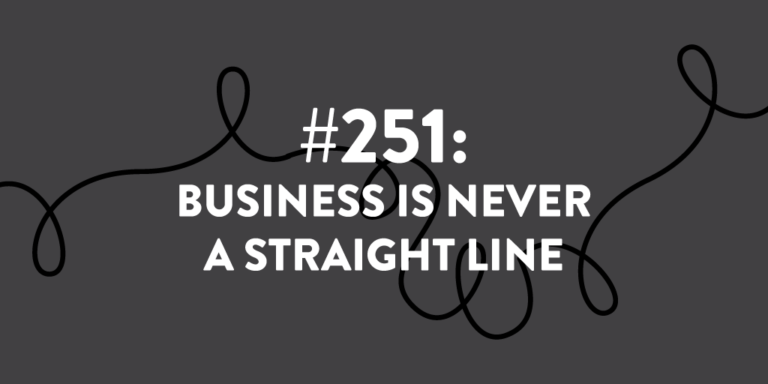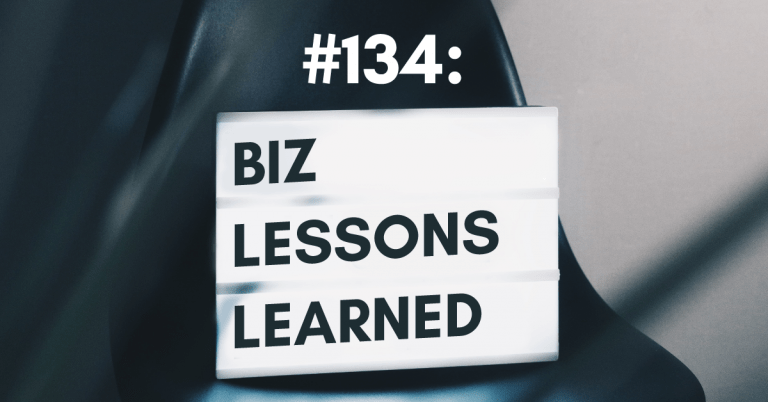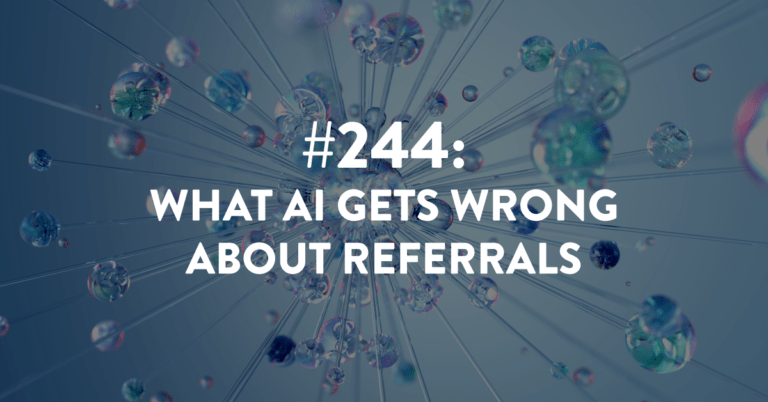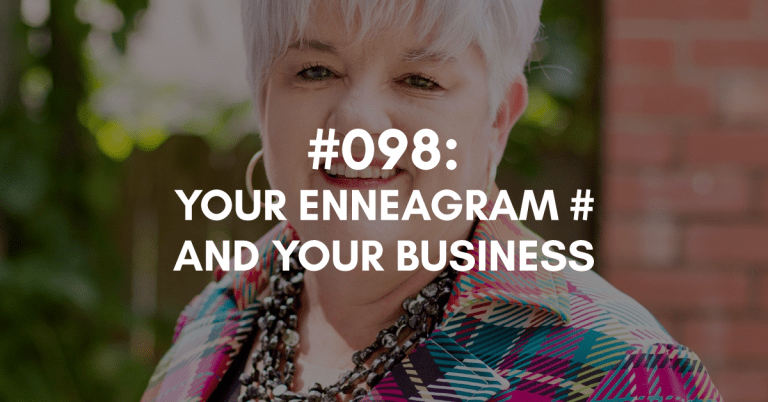Ep #265: Biz Owner Mindset: Metal Health Protection
Do you know how to detect burnout in yourself? In this episode, we delve into the crucial signs of burnout and the importance of proactive mental health management. Our guest, Cayme Andréa, Owner and Leadership & Human Capital Management Consultant of Catalyst Global, offers proven systems and methodologies to help you achieve success in both your professional and personal lives.
Listen in to learn how to recognize the warning signs of burnout and shift from a reactive to a proactive approach to mental health. You’ll hear about the impact of mental health on our ability to navigate challenges and run our businesses effectively, as well as the key components for cultivating creativity and maintaining mental clarity.
Links Mentioned During the Episode:
Want to join our Referrals Summer School? Awesome!
Learn More & Get in Touch with Cayme Andréa:
Is it time to get serious about joining Building a Referable Business™ (BRB)? First step is to submit your application BRB to see if you’re a fit.
Next Episode:
Next episode is #266, and the summer series of the business owner mindset continues!
Download The Full Episode Transcript
Read the Transcript Below:
Stacey Brown Randall: What if you had three red flags to look out for, that you may be heading for burnout and might be in a place where you’re going to have to be reactive instead of proactive in protecting your mental health?
Let’s get you this information right now.
Hey there, and welcome to episode 265 of the Roadmap to Referrals Podcast. I’m your host, Stacey Brown Randall.
My journey from a business failure to a successful business, now 10 years in. I know that generating referrals naturally and consistently has made all the difference. Working with clients around the world, we leverage the science of referrals, protect relationships above all odds and help you build a referable business.
Hey, real quick, before we dive into this really informative and fun episode, I want to ask you a quick question: how would you like to hang with me this summer?
Okay. So, maybe it won’t be in person and it won’t be at a really cool location, it’ll be online and it’ll be you in summer school with me as your professor.
I want to invite you to attend our Referrals Summer School. That’s right, you heard me. We are doing three classes this summer, all about referrals, and it’s in our Summer School. And I hope that you will sign up to join us.
So, here’s how this works. You’re going to sign up for summer school by going to staceybrownrandall.com/summerschool. And when you sign up, you’re going to get access to all three classes and I’m really hoping you join me live.
In July, they’re going to be about 30 to 45 minutes, depending how many questions you guys as students ask me. And they’re going to be classes on … the first class is going to be referrals 101, and that’s called Get Your Foundation Right.
So, you’ll leave the referrals 101 class, having all the definitions correct and understanding who the players are, the science behind consistent referrals, and the philosophy from which we operate.
Then you’re going to move into referrals 201, our second class, which is all about ecosystems and your gaps. You’re going to leave that class and having a deeper understanding of the referral ecosystem that’s available within your business, like as in right now, and identify your gaps, so you know what you can start working on. Plus, if you’ve never identified your referral sources, I’m going to walk you through it in three easy steps.
And then we’ve got our last class, which is referrals 301. And then we’re going to build the second half of your 2023 action plan. Meaning, the back half of 2023, you got to have a plan for referrals if you want to end the year referrals stronger, so you need to learn it now.
So, in this class, we’re going to get tactical and practical. You’ll learn some key referral seeds that you need to know how to plant, which are actually easier than you think, and I’m going to help you build out your action plan for more referrals for the back half of 2023.
So, like I said, each class will be about 30 to 45 minutes. There are three of them. And when you register for Summer School, you will get access to all three classes. And before you ask, yes, there will be a replay for each class. So, if you can’t attend live, you will still be able to get all the good knowledge bombs and all the learning that I will be giving.
I hope that you actually decide to join me live because I think I’m a lot of fun and I think we’ll have a lot of fun if you’re there. And being there live, you always pick up more information and then you can ask questions so you get direct immediate feedback, which is also really good, it’s something we absolutely all of us, want as well.
So, again, the link to sign up for summer school is staceybrownrandall.com/summerschool and guess what? The first class is tomorrow, my friend. So, you got to be there or be square, which means you need to stop what you’re doing unless you are driving and go sign up right now.
Staceybrownrandall.com/summerschool, get your slip to join the class. You just got to sign up so you can get all the information and be there with us tomorrow. July 12th is actually our very first class, so make sure you sign up now. Okay, let’s get back to the show.
So, we are in the middle of our summer series. We have been doing a summer series on the business owner mindset, and I have been having the best time with these conversations and I hope you are learning a lot.
We have talked about a number of really cool topics from executive state versus survival state. We’ve talked about belief formation, habit formation, and today, we have another fabulous conversation for you.
And this is all about mental health and the protection of our mental health. And I got to tell you, there’s definitely some aha moments throughout this episode that I had, so I cannot wait for you guys to hear from Coach Cayme.
She is amazing and she said some things that I was like, “Okay, I am getting called out right now on the spot” and she didn’t even know it, but it was called out in a good way.
And she really does share a lot of great information and a way to kind of shift your thinking about being proactive with your mental health versus what a lot of business owners do is wait until we’ve blown past all the warning signs and now, we’re in a reactive state of taking care of ourself.
Because remember, we need all of ourselves, our whole selves to be able to build a business that works for us, that we can also enjoy the journey as we are running and managing this business.
So, let me tell you a little bit about Cayme Andréa. She’s affectionately known as Coach Cayme, and she’s the founder of the Catalyst Coach Academy, and the CEO of Catalyst Global.
She uses proven systems and methodologies to assist individuals in clarifying, creating and sustaining successful outcomes, not only professionally, but also personally. She is an author, a coach, and she is a certified NLP practitioner with over 15 years in her industry.
She’s been featured on a lot of amazing publications like the HLN and of course, led workshops for various city and state governments, and has private clients around the world.
Alright, so here we go. Here’s my conversation and I know you guys are going to enjoy this, and you’re probably going to learn a little bit more about me in the process as well.
Cayme, I am so excited to welcome you to the podcast, this is going to be a great conversation and I know just from the little bit we chatted before we hit record is also going to be high energy. So, I am excited to spend this time with you.
Now, I told the audience a little bit about you, and I read the bio right when we did the intro. But I think it would also be great if you just told us a little bit about yourself, about your work, the things that really aren’t in your bio that my audience would be interested in.
Cayme Andréa: I love it. So, first of all, Stacey, let me just say thank you so much for having me on, I am really excited about today’s conversation.
Cayme Andréa is my name and I’m the CEO of thecatalystglobal.com, which is a leadership coaching and consulting firm. We do mostly B2B work.
But I’m also an internationally credentialed coach, and my niche is working with high-performing ambitious female leaders. And in light of today’s conversation, it’s really awesome that the work that I do helps these women align themselves, like the mind, body, spirit because we believe that once that’s aligned, that they can manifest in their business, in their life what it is that they want to manifest.
Stacey Brown Randall: I think that’s fabulous. And I think that being a business owner yourself, like you really walk in the same shoes a lot of times, especially walking in the same shoes as my audience, and then as the people that you work with as well.
And as we’re doing this Business Owner Mindset series here on the podcast as part of our summer series, we’ve been talking about a lot of different things from the mindset state that you’re in when you’re operating executive state, versus survival state and recognizing that if you’re not careful, you’ll spend all your time in survival state, which is not helpful.
And then we talked a lot about habit formation and where those come from, and belief formation, like where do your beliefs come from, the habits that you have.
And I think the typical topics that people would expect and we have more coming as well. But these aren’t the typical topics I think people expect when you’re talking about, “Hey, be a great business owner.”
I think people are like, “Productivity and how do you get more done.” But the longer you’re in business you’re like, “Oh, actually what’s going on between my ears really matters more than any tactic or any strategy or anything that I can do.”
And so, I was so glad when we were connected because I think what you do in terms of how you help your clients also helps them with burnout and mental health. And that’s what we’re going to spend some time talking about today. So, are you ready?
Cayme Andréa: I am ready, let’s go.
Stacey Brown Randall: Awesome. So, here’s the thing. I know when I say mental health, probably most people they’re like, “Yep, I gotcha.” Like, “I got this, I know what that looks like,” but I just want to make sure we’re all on the same page.
I know there’s like the academic version of mental health, there’s the healthcare version of mental health, and I think those are all like one big definition of mental health. But for you, how do you define mental health? I just want to make sure that my listeners and I are all on the same page with you.
Cayme Andréa: So, for us, mental health refers to our overall emotional, psychological, social wellbeing. It encompasses how we think, how we feel, how we behave. It affects how we handle stress, it affects how we make decisions as business owners, how we relate to others.
And when you think about, you mentioned it not too long ago, the work that we do as small business owners, our mental health directly impacts our ability to handle challenges, to make sound decisions, to maintain those healthy relationships. And at the end of the day, it affects how we run our business. Stress, that is not lost on us, small business owners.
So, it’s about finding that balance and managing stress, and maintaining those positive emotions, and coping with setbacks, because again, that’s something that as business owners, we regularly experience.
So, it’s not mental illness, which is where people like sometimes automatically go when we talk about mental health, it’s so much more than that.
Stacey Brown Randall: Oh, that’s so good. Because you’re right, I bet there are folks that when you say mental health, and if you’re not in a place or a space where you’re actively working on your mental health, protecting it, nurturing it, all the things, and you’re not like being conscious of what that looks like, and that’s being proactive with your mental health.
I can see how people would probably assume, “Wait, what we’re talking about is mental illness.” You’re right, mental illness obviously, is an important piece of it and a piece that people need to be getting support and help for if they’re dealing with that.
But that’s just a part of it within our mental health, there’s so much more, and that proactiveness is really what I want us to focus on for this conversation because one of the things … I don’t care if you’ve been a business owner for like 10 days or 10 years like me, you intimately know what it’s like to be like, “What am I doing?” And the stress and everything.
And you talked about how when we’re not always thinking as clearly as we need to because of things going on. I think about that from that perspective like, “This is not a mental health example, but it’s a physical health example.” I think about when I’m in physical pain.
So, I had mentioned this earlier in a couple of episodes that I’ve been dealing with some back pain, and sometimes you can just stand or sit too long and things can just feel irritated.
And I can find myself in that irritated state and then typing out an email, and then at least I learned this forever ago, you hit pause on yourself and quickly reread the email before you hit send. That’s just an automatic behavior in me, I learned that the hard way. After multiple reasons, I needed to learn it.
But I can go o back and reread that email and be like, “Whoa, that’s not even nice. That’s not even who I want to be in that moment.” Or like dealing with physical pain and then my kid’s asking me a question and I just want to like bite their heads off, but not them.
I mean, sometimes they’re asking the same question like 14 times, but a lot of times, it’s just because I’m in pain. And that’s not just physical. I mean, my example was physical, but that happens mentally as well.
Cayme Andréa: It does, and I would even render to suggest that the physical pain sometimes is the manifestation of what is happening emotionally. So, you’re not taking care of yourself mentally, emotionally and even spiritually, and depending on your belief system, that can manifest as disease. That’s one of the things that we teach.
Is to really look at, what are some of the possible underlying causes that are going on? What are some of the underlying emotional challenges? And Stacey, it’s funny because I am in the middle of like … so, we’re going on what, four weeks now that I have been dealing with some extreme kind of shoulder pain.
Some of it is because I’m on a computer for so long, but a lot of it is, I’ve realized that a lot of tension, a lot of stress I keep in that shoulder, neck kind of head area.
And this was a red flag for me, like, “Okay, Cayme, so what you need to do is kind of back away, like intentionally carve out some self-care, figure out what’s going on with you.”
Which resulted in regular massages. It resulted in me taking more breaks from work and switching my mindset so that I realize that it’s not about how many hours I work, but really making sure that I take the breaks that I need to take to reset myself so that I can come back and be able to focus better.
Stacey Brown Randall: I think that’s so great that you kind of use that example with your shoulder pain because it does make me think about the back pain that I have and at this point, it’s an issue that’s going to have to be dealt with medically, like however we ultimately end up moving forward with it.
But if I’m being totally honest, this started with a very small annoying little pain in my back that I just ignored. I’m like, “It’s fine, I’ll just do some more stretching, I’ll just do some more walking, it’s fine.” And then you ignore it.
And then in my case, I actually probably sought out the wrong first treatment for it, which may have made it worse. Now I’m like, “Okay, well a little bit more walking is going to just magically make this go away.” Now, I’m at the place where I’m like, “Well, this is my own fault.”
And it’s true, I think if I had paid attention to that annoying little pain, and like recognized, “Hey, I said a lot too.” Like I tell myself I don’t, because like I have to leave my office to walk back into the house to get anything to eat or to use the restroom or whatever. I feel like I’m constantly moving, but the truth is I do also sit for hours.
And in my head, I was like, “No, I’m moving …” The doctor would be like, “Well how often do you move around?” Like, “I’m moving.” I’m like, “Well, am I? Am I really?”
And so, it’s true, like it came down to that, it was that I ignored it. I didn’t practice the self-care that I needed. I mean, even like in the beginning of the year, I had a massage therapist be like, “You really need to go see somebody.” And I was like, “Whatever, dude.” Moving on, I got stuff to do. And here I am, and so, it’s my own fault.
I typically like to blame my parents for most of my physical ailments. I’m like, “I’m pretty sure this somehow had to be hereditary.” I don’t know if it was or not. And I’m sure my father’s looking down from heaven, he is like, “Knock it off, Stacey, we’re not the reason for all your problems.”
And I’m sure if my mom who does not listen to my podcast, but I’m sure if she did, she’d be like, “Excuse me, young lady?”
Cayme Andréa: Take some ownership there. There’s some opportunity to take some ownership and-
Stacey Brown Randall: She’d be like, “You are too old to not be taking ownership.” She’s like, “Isn’t that the lesson you’re trying to teach your children?” Like, “Okay mama, thank you for putting me in my place.”
So, I think this is so relevant for business owners to hear is that, I think it’s the proactiveness that we sometimes we’ll overlook because we’re so busy or ignore or maybe we’re just in a pattern of always ignoring it, and then we get ourselves to a place where we have to be reactive.
And I think living in a place of being proactive about mental health, about physical health, about your mindset, about all the things we’re talking about. I think living in a place of proactiveness for that, that’s actually really hard for people, because it means you’re always proactively thinking about everything in terms of how am I feeling? How am I thinking? What are my thoughts? What does my body feel like? And like being proactive.
And here’s the thing for business owners, it’s making the space to be proactive. It’s like you are going to go get massages. It’s not like you can do that in 10 minutes. I mean, you can, but most people want like 90 minutes.
You got to create space for that. You got to create space to work out. You got to create space to take breaks. You got to create space to just let your mind wander when you’re sitting on your back deck.
But we are not great, not all of us as business owners or humans in general, but business owners I think are just, we’re just a special breed. We’re not always great at being proactive with that.
And so, specifically for mental health, one of the things I think I see a lot, and I’ve definitely seen it in myself over the last 10 years, and before that. I’ve been in this business for 10 years, but before that I had a business fail.
So, I’ve seen this not only in my own self, but in others as well, is that it almost takes like to the brink of like burnout before we’re like, “Oh, maybe I should do something different.” And then sometimes, we do something different and things are good, and then we fall back into our default state of being, of back to being reactive.
So, when you are having conversations with business owners about burnout, because it is real for everyone, right?
Cayme Andréa: Absolutely.
Stacey Brown Randall: I think it’s about being on alert to recognize that burnout, that it’s coming before it negatively impacts you as a human and your business success, and your family or however you define your support system.
Like what would you tell people that we should be aware of or be on alert for or be paying attention to? Until we get ourselves to a state of always being proactive, what are the things we need to be on the lookout for before we’re like headed off that cliff?
Cayme Andréa: That’s a great question. So, a couple of things come to my mind. As business owners, one of the things that I know is that we are no strangers to hard work. We’re no strangers to long hours because it’s been ingrained in us that that is the process to success.
So, it’s really crucial for us, as you said, to be on alert when we start feeling chronically tired mentally and physically even … and most of us don’t get adequate rest. So, just a sidebar, we should be getting about seven to eight hours of rest a night. Raise your hand, tap yourself if that’s you.
And so, really being proactive in prioritizing that, setting your alarm to go to sleep, to start that wind down routine to make sure that you at least are getting that seven to eight hours. If you are doing that and you still wake up and you’re tired, that’s a red flag.
Stacey Brown Randall: Hey there, pardon the interruption. I just had to share these results with you. In 90 days (that’s right), three months, 90 days, a member of my Building a Referable Business Coaching Program received 30 referrals. That is 150% increase, 150% more referrals than all of last year.
So, when you hear me talking about doubling, tripling, or quadrupling the referrals of my clients who were in my coaching program, this is what I’m talking about. Yes, this is what I mean.
You need to join us inside BRB. We are waiting on you, and I can’t wait to help you do the work and follow the roadmap so you can start doubling or tripling or quadrupling your referrals, and possibly within 90 days like Randall did.
So, go to staceybrownrandall.com/referable to learn about everything you receive inside BRB, and to submit your application. The link again is staceybrownrandall.com/referable. Okay, now back to the interview.
Cayme Andréa: You mentioned earlier, irritability, when your kids are asking you these questions, becoming easily frustrated. Like they’re teenagers, they’re going to do teenager stuff. So, when you realize that your response is a little different, that you are a little more impatient than you have been, that’s another red flag.
A couple other things; I love what I do and so, I’m excited to be able to share these things with you, not just from a textbook, this is what I learned in training, but also, this is my lived experience.
I love what I do and I started realizing that I was like when I wake up, “I don’t want to go in the office today, I don’t want to work with this person.” And it had nothing to do with the person. It was just like I don’t want to do anything.
When you feel like that, when you lose interest in the things that used to excite you or you’re not willing to follow through on certain things, those are red flags that you are approaching burnout to a point that it can negatively impact your business.
Stacey Brown Randall: Okay. So, I feel like I just got slightly called out.
Cayme Andréa: Ooh, in a bad way?
Stacey Brown Randall: Nope. No, no, no, no, in a very good way because you said something I’d never thought of. I had never thought that if you’re getting enough sleep and you still wake up tired, I was like, “Oh, I never thought about that.”
Luckily, I’m a sleep queen, I’m like, “I want my eight hours, I want them every single night” but I’ve now entered this stage where my kids stay up later than me most of the time in summertime.
Not really school year, we have that lockdown, but like phones are on the counter an hour before bedtime and all that kind of stuff. And so, we’re all kind of going to bed at the same time during the school year.
But it’s summertime and my kids are now 13, 14, and 15-years-old. Like I got two high schoolers, I got a rising eighth grader and two rising sophomores. And so, they need to start, particularly the boys, need to start like learning to make good decisions and make priority choices for how they take care of themselves. But they’re teenage boys, so it’s like a long process.
And so, they go to bed later than us, and eventually, I’m like irritable about it because I’m like are they going to bed at 11 o’clock because I’m in bed at 9:30. I’m hoping to be asleep by 10.
So, are they going to bed at 11 o’clock? Are they staying up till midnight or 1:00 AM? Sometimes I find myself waking up at like two o’clock and watering through the house and making sure all the lights are out. I shouldn’t but they are children.
But it’s interesting because my husband was like, “What are you going to do when they are driving and their curfew is like midnight?” And I’m like, I am going to temporarily relieve myself from the mother role and head to the mountains and come back when they go off to college because I said, “Oh my gosh, I don’t know if I can survive this.”
And so, he’s like, “Oh, this is going to be a nightmare for everyone, including myself.” And I was like, “My poor husband.” But it’s funny because I never thought about it in that way of like, if you wake up tired, like that could be a red flag or if the irritability … I never thought about irritability from that consideration being a red flag.
Like the third example you gave, if you’re like the, “Oh, I don’t want to do this today with work” and that’s a continuation, that was me with my first business. That I didn’t want to talk about … so my first business, I was an HR consultant and I did a lot on generational diversity and employee engagement.
And there were moments I’d be like, if I had to talk about these millennials one more time, I don’t want to do this, I don’t want to stand on that stage and talk about the differences between the boomers and the Xers and the millennials.
And I got tired on the topic. In addition to the fact that my business was going down the drain because I wasn’t really good at bringing in clients then, something I figured out how to do better with this business.
But that was for me, I probably was like past the point of burnout because then eventually, the business failed and most people who listen to this podcast know my story, I had to go back to corporate America before I figured it out and started my second business, that’s this business.
But I never thought about the littler things that could be the red flags we need to pay attention to that we could be headed for some burnout. So, thank you for bringing that to our attention.
Cayme Andréa: And let me tell you Stacey, you said something else that’s really key. You like sleep, so you’re intentional about making sure that you’re in bed by 9:30, that you’re hopefully asleep by 10.
But if you are waking up in the middle of the night for any reason, then you might be sleeping but you’re not getting good sleep or you’re getting interrupted sleep, and that matters. That’s important.
Stacey Brown Randall: Yes, I am slowly but surely … how it is, it’s like baby steps. It’s like at first you wake up and it’s two o’clock and you’re wandering through the house, and then you’re like, “This is stupid.”
And so, the next time you wake up at two o’clock, “You’re like, dude, you’re not getting out of bed. You’re not allowed to get out of bed, just right back over and go to sleep.”
And Norm and I have a sleep number bed. So, we actually have the app that tells me how I’m sleeping and when did I get out of bed and when was I restless and that kind of stuff. So, I also have something that holds me honest. It keeps me honest. And so, I try to always be above 80% getting close to 90, whenever I can.
But you’re right, there’s some nights I wake up, I’m like, “Ooh, look at that. That was a 40% night, I’m tired.” But to your point, for me, that’s not the norm. But I’m guessing for some, it totally is the norm. That waking up tired.
That’s a great point. Okay. So, let’s talk then about … so my audience is listening to this conversation and maybe they’re having those aha moments like I’ve been having as well.
Let’s talk about some strategies or tools or tactics or anything that you have in your toolbox that can help us be proactive about just not only paying attention, but like managing and being like proactive when it comes to our mental health.
Cayme Andréa: So, there are four tips that I give. The first is routine, establishing a routine. I like to say routine is king, or in my case, it’s queen.
And you want to establish a routine that allows you to have breaks in your day, that allows you to exercise, that allows you to take vacations to rejuvenate yourself, and allows you, as we talked about recently, sleep. Sleep is really, really important for mental health, for repairing our body. So, that’s number one, routine.
Number two, as business owners, we got to learn to delegate. Let me just pause there. A lot of folks that I run into that are small business owners or even solopreneurs, it’s like you want to step away and look at everything that does not require your direct involvement. If it doesn’t require your direct involvement, delegate that. Learn to delegate.
Number three, third party support. You got to seek support. I like to say it’s really difficult for you to see the picture when you’re in the frame. And if you connect with a coach, you connect with an accountability team, like something like that, you want to really establish a support network where they can help you and kind of call out some things for you that maybe you’re not seeing.
And the fourth, which surprises so many people, is supplementation. I think at this stage that we’re in, especially in the United States, we’re past the conversation about, well, should we supplement? Can I get all the nutrients that my body needs that my mind needs from foods? And it’s like, “No, this is not the same food that our grandparents ate.”
Stacey Brown Randall: You mean Cheetos? What? I’m just kidding. Okay, I’m sorry. It’s actually Takis in our household.
Cayme Andréa: I was just getting ready to say that exactly.
Stacey Brown Randall: That’s just nasty. Keep going, sorry.
Cayme Andréa: It’s so bad. It is so bad. So, supplementation is important for cognitive function. It is important for our mental wellbeing.
And so, I offer seek out, if you don’t know the word Nootropics, look it up. Or the other thing are methylated B vitamins. Those are the two supplements that I’m like, “That needs to be a part of your everyday routine, your everyday habit because your brain needs it.”
Stacey Brown Randall: I feel like we could probably do a whole other episode on the eating habits and the need for supplements and selfishly just by have you go through and pick apart all the ones that I take as well.
But I think that’s something that it’s interesting, it’s like those … I mean, first of all, those are excellent four tips, but that last one is really what kind of caught my attention and maybe, it’s because I feel like I do better with the first couple.
But I think that last one is the one that is probably easily overlooked because it’s just I don’t know. I mean, I don’t think that like supplements have like a stigma to them the way maybe other things do this day and age and in our world. But I do think it’s the thing that people are like, “Yeah, yeah, I’ll get around to that. Like I’ll just go eat an apple.”
Cayme Andréa: Exactly.
Stacey Brown Randall: But eating an apple one day a week isn’t really better than nothing, but it’s not really doing much on a day-to-day basis.
Cayme Andréa: And what I have found in the work that we do with folks, is that they discount the benefit that comes from supplementation until they commit. We have them commit to 90 days. And I kid you not, after like two weeks, they’re like, “Okay, sold.”
Like the focus is there where it wasn’t before, and this doesn’t replace like having a routine. This doesn’t replace delegating or seeking support, but for me, it’s kind of the easy button. It allows you to handle some things to give your body what it needs as you are also addressing some of the other things that are happening. Right?
Stacey Brown Randall: Yes. Absolutely. I mean, the truth is we bring our whole selves to work and our whole selves to our personal life, and we need to be doing the things we need to do for our whole self. And I feel like business owners are like, “Okay, I got to make sure I exercise.” Like whether or not they make time for, it’s a totally different conversation.
But like I feel like that is a drum beat for the last couple of decades. It’s like back when we were … well, I don’t actually know how old you are, but I’m just going to say back when we were kids, there was the, “Just say no to drugs.” Like that was the drum beat of the children of the eighties, the teens of the nineties or whatever.
That was like the drum beat. And you see now like exercise is the new smoking, it was like, “Don’t start smoking.” And now, it’s like, “Hey, you need to exercise.” I feel like that one has been like that drum beat, it’s been beaten over our heads for that one, but it’s so much more than that.
Cayme Andréa: It is, and I like to disrupt the thinking by saying, if you have to choose between exercising and getting 7to 8 hours of sleep, get the sleep.
Stacey Brown Randall: Yeah. That’s when your body like heals itself.
Cayme Andréa: Yes. Exactly, exactly.
Stacey Brown Randall: I tell that to my kids all the time, but I’m just the mother. Someday they’ll realize my brilliance. But I will probably be old and they probably won’t remember.
So, this has been awesome. Thank you so much for your time today. I really appreciate it. I wanted to wrap up by making sure that my listeners do know where they can go if they want to reach out to you or they want to learn more about you.
Of course, guys you know this listeners, that we will put this in the show notes, so you can go directly to the show notes for this episode, and then be able to find these links. But why don’t you go ahead and tell my listeners as well where they can find you.
Cayme Andréa: Sure, easiest placed, place is caymeAndréa.com. And what I want to suggest is that they sign up for our newsletter. We’ve got a lot of exciting opportunities that I believe your listeners, especially if they followed along in our conversation up until now, that they’ll find valuable.
Stacey Brown Randall: Awesome. Okay guys, so we will put the link to the website there, so you guys can go and subscribe to the newsletter. I will be doing that as well. I think that a business owner who has decided they don’t need to continue growing is typically a business owner that won’t be in business for too much longer. So, we need to be being willing to open.
I know this podcast is typically all about referrals and all about business growth and what it looks like from that perspective to grow your business. but your health, your mental health and your mindset, what’s going on between your ears, what’s going on amongst your entire body, that matters as well if we want to have really productive and successful and fruitful businesses, however you define success and fruitful for you.
So, thank you again for being with us. I really appreciate it.
Cayme Andréa: Thank you. Thanks for having me.
Stacey Brown Randall: What a fantastic interview. I hope that you guys really enjoyed that as much as I did. I mean, those red flags like waking up tired and being irritable, I was like, “Oh, I never really thought about that as a red flag that I could be on the path for burning out or needing to be a little bit more proactive in protecting my mental health and taking that break and recharging when I need it.” Those were great.
And I really want to encourage you to go back and listen again to her four tips. They were great as she was mapping them out for us, and sometimes, things like that, we just need to hear more than once before we’re like, “Okay, okay, I’ll put them into practice.”
So, awesome. I’m so glad you guys joined us for this interview and that we had that great conversation.
Of course, the show notes link for this episode is staceybrownrandall.com/265, so you can find all the information that we talked about and the links to Cayme’s website as well at that link, which is staceybrownrandall.com/265 That is the show notes link for this episode. And of course, the transcripts will be there as well.
And hey, before I let you go, I do want to remind you of what I talked about at the top of the episode Summer School, my friend, it starts tomorrow. And in this Summer School, we’re talking about generating more referrals and setting you up to have a strong strategy and a plan for how you’re going to be able to start generating more referrals and what you should be doing and working on for the back half of this year.
So, if you want to sign up, remember, first class referrals 101, starts tomorrow, July 12th. It’s our first class of a three-part class series.
And of course, to sign up, you got to go to staceybrownrandall.com/summerschool. That’s right, its summer school time, baby, and it’s going to be a lot of fun. You should definitely join me. Don’t forget, Stacey has an “E.” That link again is staceybrownrandall.com/summerschool.
Okay, coming up next week is episode 266, and of course, we are continuing with our summer series of the Business Owner Mindset. We’ve got just a couple of amazing episodes left for you as we get ready to start winding down this series.
So, until then, you know what to do, my friend. Take control of your referrals and build a referable business. Bye for now.

